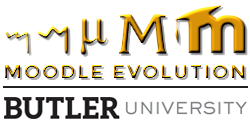Physical media is such a pain. The perfect documentary VHS is wearing out. The Spanish language DVD has a scratch in it. We don’t want our students to have to buy a $30 book for one essay. Things would just be easier if we could just put everything in Moodle and call it a day. That’s basically what it was designed for, right? It’s a home for course materials!
Unfortunately, copyright law hasn’t quite caught up with today’s technologies and some of the uses that seem like common sense require a bit more legwork to be legally compliant. There are four primary ways to ensure that your use doesn’t infringe on creators’ rights:
Link Instead
Are you wanting to use an article? A book chapter? A video? Check and see if we have access to it through the library or if it’s freely available online. If it’s an essay or article from a popular news source and you want to ensure the link continues to work for future semesters, you can use the Internet Archive’s Way Back Machine “Save Page Now” feature to get a URL that will work in the long-term: https://archive.org/web/. (Note: this will only work for sites that permit crawlers; if you’re unsure if your site will work, try it and see!)
Instead of posting an article you downloaded from one of our databases, post a persistent link. Guidelines for how to do this are available on LibGuides. Make sure you check the library’s databases for videos and other materials: we might have access to exactly what you’re looking for already… or a first-rate alternative!
Do A Fair Use Evaluation
There are a number of exceptions made for educators and classroom uses, so it’s entirely possible that your use falls within these exceptions. There are no hard and fast guidelines as to whether or not your use is fair: you have to do a fair use evaluation for each use. I highly recommend using this fair use evaluator: http://librarycopyright.net/resources/fairuse/
It will walk you through, step by step, each of the factors that weigh for and against fair use and give you language to use to describe your use. In the end, you’ll be able to print out a fair use evaluation with all of this information for your records. A good faith fair use evaluation is powerful indeed.
Ask Permission
So you’ve done your fair use evaluation and you’re not feeling confident in your results. One easy way to ensure everything is kosher is to write to the publisher/rights-holder and ask for permission to use their materials. We’ve even drafted an example letter that you can adapt–just fill in a few blanks and email it off to the rights-holder. Two notes of caution here: first, the author of a book or article is rarely, if ever, the rights-holder of their book or article. Second, it can sometimes take upwards of 2-6 weeks to get a response. Plan your requests accordingly!
Buy the Rights
One of the requirements for fair use is that a digital facsimile is not available for a reasonable cost. If such a facsimile is available (like a streaming video option or an ebook for purchase), this is something that the library is willing to look into! This is not always possible due to cost and breadth of use, but please contact me (see above) to see if we can purchase these rights on your behalf. Rights to chapters from books and textbooks and articles can often be purchased for use on Moodle from the Copyright Clearance Center for a fee. This is generally the only way to use a chapter from a textbook.
While it can be frustrating not to have hard and fast rules and guidelines to rely on for copyright questions, it also gives us some leeway. If you have any questions about this process or other copyright issues, please feel free to contact me any time.
PERMISSIONS EXAMPLE: https://www.dropbox.com/s/buqzwdsifmhcay9/Permissions.doc?dl=0
Blogger, Franny Gaede, is the Scholarly Communication Librarian for Butler University Libraries. She is the manager of Digital Commons @ Butler University, an open access archive of scholarly and creative work emanating from the university. She is also the liaison for the Department of Philosophy, Religion, and Classical Studies; Modern Languages, Literatures, and Cultures; and Global and Historical Studies. While Franny is unable to provide legal advice, she is available for consultation on copyright issues by email (fgaede@butler.edu), phone (317-940-9549), or in person (Irwin Library 106).
